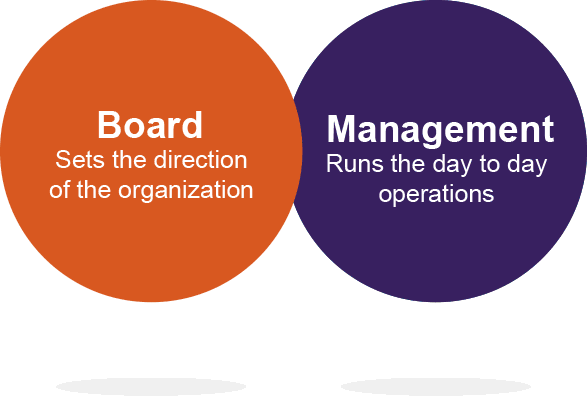A board of directors is a group of people who are legally responsible for the supervision of the organization they serve.
The Board’s role differs from the roles of senior management and staff of an organization. Here’s how:

Role of the Board
The Board’s main role is to approve policies and budgets that will best serve the organization from an ethical, financial and legal standpoint.
To act according to the constitution and bylaws set out in the organization’s articles of incorporation, and in accordance with its established budget and policies, a Housing Board of Directors:
- provides financial oversight and monitoring
- makes sure management/staff are following official policies
- meets on a regular basis, typically once a month
- organizes and appoints committees to make recommendations to them on complex issues
- works collaboratively with key management/staff members
- conducts periodic evaluations of the organization’s operations, with a view to improving them
- hears and responds to complaints and appeals from residents
Note: The terms “board member” and “director” are used interchangeably.
See also: What are my responsibilities as an individual director?
Management/staff has two main roles:
- Works with the Board in drafting budgets and policies
- Operates the Corporation on a day-to-day basis in accordance with the established budget and policies.
In short, the Board governs the organization; management/staff operates it.
Text on screen: Title- “A Strong Foundation for Your Housing Project: Board of Directors”
(Visual: M’akola housing)
Narrator:
Housing Co-operatives and non-profit organizations are both governed by a
group of volunteers called the board of directors. The board sets the
direction of the organization, and delegates the day-to-day operations to
staff or committees.
(Visual: English Narrator)
Text on screen: “Sets the Direction”, “Delegates the Day
to Day Operations”
Text on screen: Title - “Roles”
Narrator:
Legally, an incorporated organization must have a minimum number of
directors who are appointed to certain official positions. No board member
may receive financial gain for being on the board.
Text on screen: “Position: President, Vice-President, Secretary,
Treasurer”
Text on screen: Title- “Board Training”
Narrator:
The make-up of each particular board is always different, so you must make
sure board members understand their new roles and responsibilities. Copies
of minutes from past meetings, and well documented processes, will help
new board members get up to speed quickly. A strong board includes members
who have experience in a variety of areas relating to the
organization’s operations.
Text on screen: “Roles & Responsibilities”
Text on
screen: “Experience: Finance, Accounting, Maintenance, Legal &
Property Management”
Text on screen: Title-
“Recruitment”
Narrator:
Get creative to find and attract the right people. Use your networks,
including social networks, to create interest. People who are passionate
and genuinely interested in the housing needs of the local community will
often make the best board members.
Text on screen: “Passionate & Interested”
Text on
screen: Title- “Succession Plan”
Narrator:
You should always be looking for the next leaders, and encouraging younger
members of the co-operative or the organization to get involved.
Text on screen: Title- “M’akola Group of Societies, Victoria, British Columbia”
Opening: (Visual: M’akola housing)
Kevin Albers:
M’akola was created by a volunteer board of directors back in 1984,
to address the issues that were facing urban Aboriginal people trying to
secure safe, affordable, and reliable housing.
The board of directors of M’akola consists of 11 different community
members. Everything from professionals, to executive directors, to
educators.
The members represent a cross section of the communities in B.C. that we
provide housing in.
(Visual: Interview of Kevin)
(Text on screen: Kevin Albers, Chief Executive Officer)
(Visual: B-roll of Kevin, David, M’akola housing and office)
David Seymour:
The culture of the organization is essential that they are feeling part of
the team. That’s what motivates the board of directors.
(Visual: Interview of David)
(Text on screen: David Seymour, Vice President)
(Visual: B-roll of David and Kevin walking and discussing)
Kevin Albers:
The satisfaction is knowing that we're doing the things that they had
always planned for M’akola to do, and that’s what drives them
to continue to be active participants in the governance of M’akola.
(Visual: Interview of Kevin)
(Visual: B-roll of Kevin presenting resident with gift and talking in her
home)
David Seymour:
My favourite part of M’akola is to be part of something bigger than
me. Not only do I get to work with people of similar mind, I get to be
helping those that I’ve always wanted to help and I can see my
results.
(Visual: Interview of David)
(Visual: B-roll of M’akola housing, David and Kevin talking,
Aboriginal art)
(Text on screen: Want More Information? Visit CMHC.ca/Affordablehousing to
learn more about the governance of your organization.)
(CMHC logo on screen)
(Canada wordmark)
(Social Media Icons)
(Music ends)






 Share via Email
Share via Email
